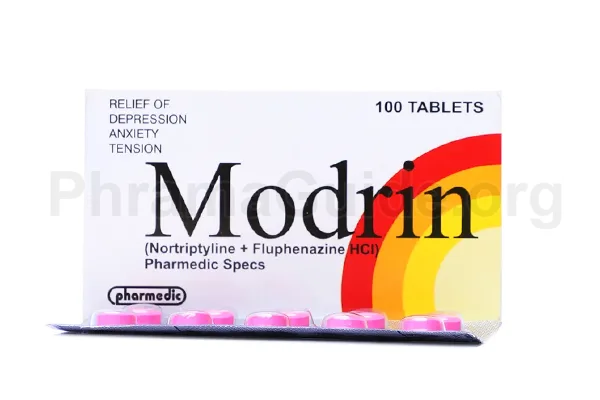Modrin is a psychotropic medication that is used to treat a variety of mental health conditions, including depression, anxiety, and schizophrenia. Modrin is an effective medication, but it can also cause a variety of side effects, both common and serious.
Common Side Effects of Modrin
- Drowsiness or Sedation: Many people experience drowsiness or sedation, especially when they first start taking Modrin. Taking it at bedtime can help mitigate this side effect.
- Dry Mouth: Modrin often causes dry mouth, which can be managed by staying hydrated, using sugarless gum or candy, and practicing good oral hygiene.
- Constipation: Constipation is a common side effect of Modrin. A high-fiber diet, plenty of fluids, and regular physical activity can help alleviate this issue.
- Blurred Vision: Some individuals may experience blurred vision while taking Modrin. If this occurs, it’s essential to report it to your healthcare provider.
- Weight Gain: Weight gain is a potential side effect for some people taking Modrin. Maintaining a healthy diet and exercise routine may help mitigate this.
- Increased Heart Rate (Tachycardia): Modrin can lead to an increased heart rate in some individuals. If you notice a rapid or irregular heartbeat, consult your healthcare provider.
- Orthostatic Hypotension: This refers to a drop in blood pressure when standing up, which can cause dizziness or lightheadedness. Rising slowly from a seated or lying position can help minimize this side effect.
- Increased Sweating: Some individuals may experience excessive sweating while taking Modrin.
- Extrapyramidal Symptoms (EPS): These are movement-related side effects commonly associated with antipsychotic medications. They can include symptoms like:
Parkinsonism: Tremors, rigidity, and bradykinesia (slowed movements).
Dystonia: Involuntary muscle contractions that can cause twisting movements or postures.
Akathisia: Restlessness and an inability to sit still. - Tardive Dyskinesia: This is a potentially irreversible side effect that can occur with long-term use of antipsychotic medications like Modrin. It involves involuntary and repetitive movements, often of the face and mouth. Early detection and management are crucial.
Serious Side Effects of Modrin
- Allergic Reactions: Although rare, Modrin can cause severe allergic reactions characterized by symptoms like rash, itching, swelling, severe dizziness, and difficulty breathing. Seek immediate medical attention if you experience these symptoms.
- Suicidal Thoughts: Antidepressants like Modrin may, paradoxically, increase the risk of suicidal thoughts or behaviors, particularly in young adults. Close monitoring is essential when starting or discontinuing the medication, especially in this age group.
- Serotonin Syndrome: This is a rare but potentially life-threatening condition that can occur when there is an excess of serotonin in the body. Symptoms include agitation, hallucinations, rapid heartbeat, fever, muscle stiffness, and tremors. Seek immediate medical help if you suspect serotonin syndrome.
- Cardiac Effects: Modrin can affect the heart’s electrical activity and may lead to arrhythmias (irregular heart rhythms), particularly in individuals with a preexisting heart condition. Inform your healthcare provider if you have heart-related concerns.
- Liver Problems: Rarely, Modrin can affect liver function. If you experience symptoms like yellowing of the skin or eyes (jaundice), dark urine, or persistent abdominal pain, contact your healthcare provider.
- Seizures: Although uncommon, Modrin may lower the seizure threshold, potentially increasing the risk of seizures.
- Withdrawal Symptoms: Stopping Modrin abruptly can lead to withdrawal symptoms, including nausea, headache, and mood changes. It’s essential to taper the medication under the guidance of a healthcare professional when discontinuing it.
- Neuroleptic Malignant Syndrome (NMS): Although rare, NMS is a severe reaction to antipsychotic medications like Modrin. It is characterized by symptoms such as high fever, muscle rigidity, altered mental status, and autonomic dysfunction (irregular blood pressure and heart rate). NMS is a medical emergency requiring immediate attention.
- QT Prolongation: Modrin can affect the electrical activity of the heart and lead to a prolonged QT interval on an electrocardiogram (ECG). This may increase the risk of potentially life-threatening ventricular arrhythmias, like torsades de pointes.
- Blood Disorders: Rarely, Modrin can affect blood cells, leading to conditions like agranulocytosis (a severe reduction in white blood cell count), which can increase the risk of infections.
- Hyperprolactinemia: Modrin can elevate levels of the hormone prolactin in some individuals, leading to side effects such as breast enlargement and milk production in both men and women.

What is Modrin?
Modrin tablet is a combination of Nortriptyline and Fluphenazine, manufactured and marketed by Pharmedic (Pvt) Ltd, Pakistan.
Modrin : Available Formulations and Strengths
Presently, Modrin is available in tablet form.
Modrin Each Tablet Contains:
- Nortriptyline (HCl): 10mg
- Fluphenazine: 0.5mg
What Are The Possible Drug Interactions of Modrin?
Modrin tablets can interact with a variety of other medications, including over-the-counter medications and herbal supplements. Some of the most common drug interactions include:
- Monoamine oxidase inhibitors (MAOIs): Modrin tablets should not be taken with MAOIs, as this can lead to a serious and potentially life-threatening condition called serotonin syndrome.
- Other antidepressants: Modrin tablets can interact with other antidepressants, such as selective serotonin reuptake inhibitors (SSRIs) and serotonin-norepinephrine reuptake inhibitors (SNRIs). This can increase the risk of side effects, such as serotonin syndrome and neuroleptic malignant syndrome (NMS).
- Blood thinners: Modrin tablets can interact with blood thinners, such as warfarin, and increase the risk of bleeding.
Antipsychotics: Modrin tablets can interact with other antipsychotics, such as haloperidol and risperidone. This can increase the risk of side effects, such as TD and NMS. - Sedatives: Modrin tablets can interact with sedatives, such as alcohol, benzodiazepines, and opioids. This can increase the risk of drowsiness, dizziness, and impaired coordination.
Check out the detailed information on Mordin Tablet Uses

Leave A Comment